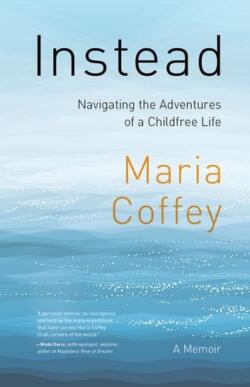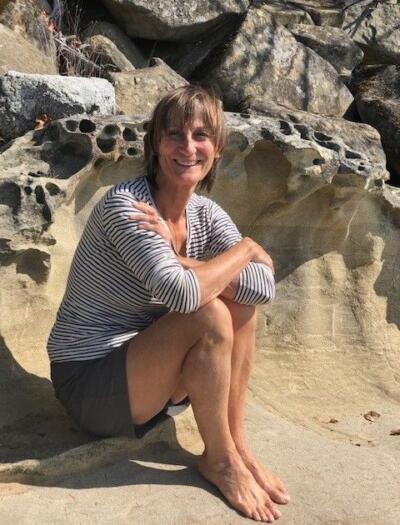1946 Choice, responsibility, consequence
Instead: Navigating the Adventures of a Childfree Life – A Memoir
by Maria Coffey
Calgary: Rocky Mountain Books, 2023
$28.00 / 9781771606400
Reviewed by Mary Ann Moore
*
Maria Coffey who is based in Victoria, British Columbia and Catalonia, Spain, started travelling when she was a teenager. Various circumstances including her keen sense of adventure, brought her to Canada from England, where she was born.
who is based in Victoria, British Columbia and Catalonia, Spain, started travelling when she was a teenager. Various circumstances including her keen sense of adventure, brought her to Canada from England, where she was born.
Coffey met her husband, Dag Goering, in Nanaimo, B.C. and together they sought out daring journeys to out-of-the way places in India, Africa, and Southeast Asia. Their travels led to offering adventure treks for others, at first with Mountain Travel Sobek, and then with their own business, Hidden Places, started in 2000. A conservation branch, Elephant Earth, followed a few years later.
Besides physically challenging journeys, Coffey has travelled an emotional landscape, forging heart-opening as well as heart-wrenching connections with friends, family members, and others she encountered along the way. And as Wade Davis says in his endorsement of the book: “A personal memoir [is] as courageous and bold as the many expeditions that have carried Maria Coffey to all corners of the world.” Coffey has shown courage in all respects.
She threads several strands beautifully and expertly throughout her memoir: the call to adventure, the call to write, whether or not to have children, along with reflections on personal relationships including the sometimes fraught one she had with her mother.
A quote from UK author Emma Gannon, included in the book, seems to describe Coffey’s situation well: “She hadn’t chiselled the fact that she didn’t want children into stone; she came on to it naturally, gradually. It was something that made sense to her as she lived her life.”

Coffey recreates intimate family scenes very well including details such as her dad’s checked pajamas and the net over her mum’s permed hair in the family kitchen in Wolverhampton in 1971. Her mum was glad Coffey got travelling out of her system as she had hitchhiked through Italy and slept on beaches in the Greek Islands during her first summer break from Liverpool University.
Travelling was far from out of Coffey’s system as she continued to travel and has written nine books about her adventures, including this one, plus four books for children.
Coffey became a teacher at Liverpool high school, one of her mother’s hopes for her, but gave it up after a year to follow her boyfriend Nigel to Peru. Later she would teach in Manchester and when she moved to Canada, in Nanaimo.
Through her brother Mick, Coffey was introduced to the “climbing scene in North Wales.” Although she vowed she wouldn’t get involved with a mountaineer due to their long and dangerous expeditions, she did have a relationship with world-class mountaineer Joe Tasker. It was early June 1982 when Coffey got the news that Tasker and his climbing partner Pete Boardman had disappeared on the Northeast Ridge of Everest.
In 1986, Coffey fled across the world to Canada specifically Nanaimo, on Vancouver Island, rather than Vancouver which she had intended. She felt as if she was in the Canadian version of “hardscrabble” Wolverhampton where she was born.
Coffey first spotted her husband Dag Goering in a supermarket. She would learn that he had a veterinary degree and was continuing research on fish pathology at the Pacific Biological Station in Nanaimo for his PhD.
They both had ferweh, a German word that describes “an ache to explore faraway places.”
As for having children, “Five kids would be perfect,” Goering said soon after they met.
Coffey had fears around motherhood due to a near-drowning experience in her early twenties which was compounded when her boyfriend disappeared on Everest. “Since then, love had been shadowed by fear,” she writes. “No matter how I tried to rationalize it, the thought of having a child, of opening myself up to the possibility of the worst kind of bereavement, terrified me.”
In 1987, Coffey and Goering moved into a cabin that had no bathroom and no running water on Protection Island, in Nanaimo’s harbour. Coffey learned to kayak. In fact, Goering built them a couple of boats at a fiberglass shop he worked at.

When Goering went to Munich to defend his PhD and Coffey stayed at home, she got out a suitcase full of journals she had been carrying around for five years.
“Why does anyone start to write? For me, it was catharsis. I had no choice, I was obsessed, driven to get the story out, to release pent-up emotions,” Coffey writes.
Sitting in her little office on Protection Island, she recreated her relationship with Joe Tasker. That writing became her first book: Fragile Edge: A Portrait of Loss on Everest.
The kayak Coffey and Goering travelled with was a folding Klepper kayak. Its wooden frame could be taken apart and the various parts folded up to be stowed in a couple of large suitcase-sized bags.
Friends had suggested kayaking in the Sea of Cortez and the couple took on the challenge. It was 1989 and Coffey had joined Goering in Baja, Mexico.
The El Norte wind had them marooned at times as they explored islands, desert landscapes and “clear blue waters teeming with fish.”
While the two were paddling hard through building waves to their final destination, Puerto Escondido, Goering said he had been thinking “that we could easily have a baby along on a trip like this.”
Coffey reconstructs their argument which ends with protected waters and a desire on Coffey’s part not to talk about babies again.
On a year’s sabbatical with round-the-world tickets, Coffey and Goering set off for the Fijian island of Viti Levu. They also spent two months in the Solomons, where, along the way, people would ask: “Where are your children?”

Coffey becomes braver as time passes including paddling on the open ocean of New Georgia Sound “renowned for its tiger sharks” for thirty hours and speaking up for herself regarding not having children.
While in India, in Gessapur, one of the villages they visited, Coffey was 39 Goering 34. “My age, my being older than my husband, and being childless became the village scandal.”
“I thought about the open-ocean crossing in the Solomons; the hippos that grazed around our tent in Malawi while we lay inside, holding our breaths; the floating bodies we bumped into along the Ganges. I wasn’t sure I needed life to get any more interesting than that.”
Coffey spoke to her mother on a visit to her in England: “That I loved her greatly, but I couldn’t bring myself to sacrifice my dreams for hers. I had to make my own life, and fate and circumstances had brought me to a place far away from her.”
In 1992, when they returned to Vancouver from the year-long trip Goering’s mother Justina said: “ I was hoping there would be a baby in there.”
Instead is a beautifully crafted memoir, engaging all the way through and becomes particularly captivating when reading about the couple’s journey to Vietnam. Among the friendships made are two made with children.
One of them is a boy called Vinh who has one leg missing from the upper calf. He sings on the street while leaning on a crutch, playing spoons and selling postcards. He was twelve at the time. Later, Coffey and Goering meet his younger sister Bac. When Bac slips her hand into Coffey’s she is “besotted, with all my protective instincts suddenly roused.”
Adoption, if it were possible, would take the children away from their culture and their father. One possibility for the children was an SOS village the first of which was set up in Saigon in the 1960s due to all the children being orphaned by the American war.
“Fearing loss was one of the reasons I decided not to have children. Yet loss found me all the same,” Coffey writes as she reflects back on Bac and Vinh. (She and Goering continued to lead trips to Vietnam twice a year.)
Maria Coffey has shared anguishing experiences and exciting ones. All of her descriptions whether meeting her future husband, having an emotional conversation with her mother, or remembering a loss, have a very real presence which readers can feel as well.
While she may have been judged along the way for choosing not to have children, Maria Coffey hopes her story “can help to challenge and change those attitudes that, whether non-parents or parents, we can understand and support each other as we navigate our lives, and the nuanced outcomes of our personal ‘insteads’.”
Close to the end of her life, Coffey’s mother asked her: “Have you ever regretted not having children?”
Coffey replied: “No, Mum. Never. I’m really happy with my life.”
*

Mary Ann Moore is a poet, writer and writing mentor who lives on the unceded lands of the Snuneymuxw First Nation in Nanaimo. Her full-length book of poetry is Fishing for Mermaids (Leaf Press, 2014) and she has a new chapbook of poems called Mending (house of appleton). Moore leads writing circles and has two writing resources: Writing to Map Your Spiritual Journey (International Association for Journal Writing) and Writing Home: A Whole Life Practice (Flying Mermaids Studio). She writes a blog here. [Editor’s note: Mary Ann Moore has also reviewed books by Lorna Crozier, Katherine Palmer Gordon, Donna McCart Sharkey & Arleen Paré, Michelle Poirier Brown, and Celia Haig-Brown, Garry Gottfriedson, Randy Fred, & the KIRS Survivors for BCR.]
*
The British Columbia Review
Interim Editors, 2023-24: Trevor Marc Hughes (non-fiction), Brett Josef Grubisic (fiction)
Publisher: Richard Mackie
Formerly The Ormsby Review, The British Columbia Review is an on-line book review and journal service for BC writers and readers. The Advisory Board now consists of Jean Barman, Wade Davis, Robin Fisher, Barry Gough, Hugh Johnston, Kathy Mezei, Patricia Roy, Maria Tippett, and Graeme Wynn. Provincial Government Patron (since September 2018): Creative BC. Honorary Patron: Yosef Wosk. Scholarly Patron: SFU Graduate Liberal Studies. The British Columbia Review was founded in 2016 by Richard Mackie and Alan Twigg.
“Only connect.” – E.M. Forster
7 comments on “1946 Choice, responsibility, consequence”
Thank you, Mary Ann, for this lovely and generous review of my memoir!
Maria